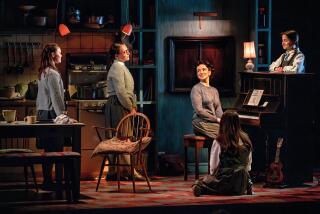Couples’ Therapy : “The Couch” looks at psychiatrist Carl Jung’s relationships with his wife and lover and the famous break from mentor Sigmund Freud
Like many married men, pioneering psychiatrist Carl Jung had a mistress. That would be one of the least interesting aspects of this seminal thinker’s life if not for the unexpected reaction of his wife, Emma.
She found she could live with it.
In fact, she gradually forged a close bond with Jung’s lover, Toni Wolff, who, as did Emma herself, became an analyst. The three, who were known to travel to conferences together, formed a relationship that lasted for years.
Writer Lynne Kaufman learned of this unusual arrangement during a conference on Jungian thought at UC Berkeley. “One of the speakers told the story of the triangle,” she recalled. “I thought, ‘I want to see it.’ ”
The result of this impulse was Kaufman’s first play, “The Couch,” which ran five months and won numerous awards when it premiered at San Francisco’s Magic Theatre in 1985. It will make its local debut Friday at the Fountain Theatre in Hollywood.
The two-act comedy concerns both Jung’s relationship with his two loves and the famous break between him and his mentor, Sigmund Freud. Jung was Freud’s primary protege until he realized that he was not in total agreement with his teacher’s theories. Their split was bitter and painful.
“Lynne’s intent initially was to humanize these two icons,” said director Simon Levy, who started the original San Francisco production and is doing the same in Los Angeles. “In the process, it became the story of the women, who find a solution to a problem that neither Jung nor Freud could figure out.”
Kaufman defines that problem--which she calls “one of the pitfalls in intimate relationships”--as our tendency to form a rigid definition of the other person, then resist when he or she begins to change.
“That’s what makes marriage so deadly,” she said. “The key is allowing the other person to be free, and still trusting that they’ll love you and be there for you. I think it’s openhearted and courageous of Emma to love someone enough to go along with this.
“Jung needed something more than was allowed in both of these relationships,” Kaufman said. “He needed to come up with his own theories as to what was at the heart of human nature. And he needed the romantic passion he wasn’t getting in his marriage.
“Jung wanted to keep his relationships with both Freud and Emma, but he needed more. Freud did not allow him to have more. Emma found a way to compromise, by being compassionate. That’s why I think she’s the heroine of the play.”
Not surprisingly, some Bay Area feminists responded to the play with anger. “They stood up at forums afterward and said, ‘He’s slime, and she is, too, for letting him” have two women, Kaufman recalled.
The playwright’s response: “I think adultery is, in some cases, very bad and very harmful. But I don’t think it has to be. Emma is revitalized by this. It enables her to break out of her mold.”
And “The Couch” allowed Kaufman to break out of her own mold. Before writing this play, she had specialized in short stories. With their limited time requirements, they proved the perfect answer to the problem of writing while raising small children.
Once her eldest child “was at the age where she could cross the street by herself,” Kaufman’s repressed urge to write longer pieces came to the fore. Having studied dramatic literature at Columbia University, she was familiar with the form. It seemed a natural medium for the story of Jung and his women.
She sent the play qto Martin Esslin, a drama scholar she met at UC Berkeley (where she directs the Extension’s international travel studies department). He liked it and recommended it to the Magic Theatre, where he was working as dramaturge. The production opened in February, 1985, and became the Magic’s longest-running show.
Since then, Kaufman has concentrated on playwriting. Six of her 10 subsequent plays have been produced. Several deal with historical figures. Her “Speaking in Tongues,” which concerns James Joyce and Samuel Beckett, was recently produced at the Cast Theatre. Her latest, “Shooting Simone,” centers on Simone de Beauvoir and Jean-Paul Sartre. It premiered in March at the Humana Festival in Louisville, Ky.
Kaufman enjoys dramatizing historical characters but uses only those with whom she feels an emotional bond.
“I link them up with something in my own psyche. In the case of Jung, it’s the feelings that arise when I want to hold onto something stable and wonderful, and I want an adventure too. Going inside of this historical character, who was facing the same issue, gave me the courage to explore my own dilemma much more honestly.
“So I was true to his spirit, true to his search, true to his ideas. But I was animated by my own very personal questions.”
With that established, it seemed only fair to ask Kaufman whether she would be as accepting as Emma was if she discovered her husband in the midst of an affair.
“Probably not quite as,” she admitted. “But I think, after feeling the initial outrage over being invaded, I’d want to know what was going on there. It would probably intrigue me.”
“The Couch” opens Friday at the Fountain Theatre, 5060 Fountain Ave., Hollywood. It plays Fridays through Sundays until Aug. 22; Aug. 5 adds Thursday performances. All shows are at 8 p.m. Tickets are $15. Call (213) 663-1525.
More to Read
The biggest entertainment stories
Get our big stories about Hollywood, film, television, music, arts, culture and more right in your inbox as soon as they publish.
You may occasionally receive promotional content from the Los Angeles Times.










